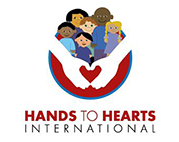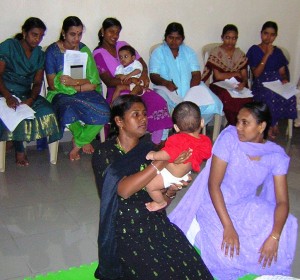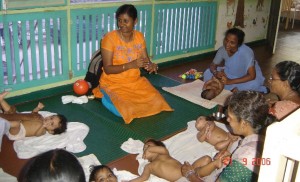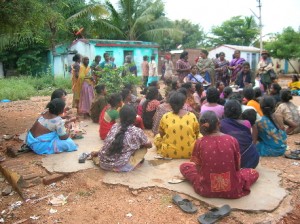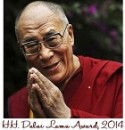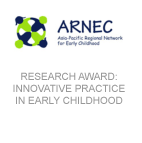A three-part series highlighting different perspectives of women involved with Hands to Hearts International.
Part 2: From orphanage caregivers to mothers in the most remote villages in India, HHI Master Trainer, Sujatha Balaje, educates and inspires.
By Laura Barker
HHI Master Trainer Sujatha Balaje is a natural with children—she has been working with them all her life. Her mother runs a school and orphanage in Sujatha’s hometown of Chennai, India, a city of over four million people and the capital of Tamil Nadu State on the southeastern coast. Growing up, she helped care for the babies and worked part time in the kindergarten class. Her husband’s family also operated an orphanage in Chennai and it was through her work at this orphanage that Sujatha first became involved with Hands to Hearts International. When executive director Laura Peterson came to oversee HHI’s first training program at the orphanage in 2006, it was Sujatha who translated. More than her language skills, Laura immediately recognized the instinctual way Sujatha interacted with the children and her gift for working with people. She knew Sujatha was the type of person she wanted on HHI’s team.
Since February of 2006, Sujatha has been enriching the lives of hundreds of Indian women and caregivers and thousands of children through her dynamic training sessions on early childhood development. In her first year, she trained all the caregivers at the local orphanages and now leads four training sessions a month in rural villages in the remote Theni district. Because the women she serves live in extremely isolated areas, she is required to take several buses and sometimes walk several more kilometers to reach them. Trainings take place over two days and normally involve about 20 women at a time.
HHI’s program is designed to educate parents and caretakers on early childhood development and includes curriculum on cognitive, language, social, emotional, and physical development, responding to baby cues such as facial expressions and verbal sounds, and therapeutic baby massage. Sujatha masterfully weaves local songs, dances, and traditions into her agenda. “The purpose of the training,” she says, “is to educate mothers to understand the value of early childhood development . . . and to help them find the physical, emotional, and mental changes in their children.” She says her favorite parts of the trainings are the baby massage, songs and dance, and the focus on health and hygiene, an element of the program she herself designed. Sujatha is the star of HHI’s Baby Massage DVD in which demonstrates the massage techniques she teaches the women.
Traditional beliefs about education are slowly changing in India. While it was once common practice for parents to educate only their sons, now they are much more likely to send all their children to school. Sujatha praises the educational system in Chennai saying it is “considered one of the best in India” and also credits the Indian government with helping to change opinions on equal access to schooling by improving education across the board. Despite this progress, however, ancient practices still exist, though they differ from state to state, community to community and caste to caste. Mothers in rural places in particular have a tough time bringing up their children due to deeply ingrained gender bias for boys, a lack of education and health services, difficult environmental conditions, and bleak financial situations. It is Sujatha’s job to develop innovative and culturally appropriate lessons to give caregivers effective strategies for how best to nurture their children.
In the over four years she has worked for Hands to Hearts, Sujatha has had incredible success. Her effectiveness in the orphanages in particular is beyond compare. Despite the good intentions of staff members, the conditions in many Indian orphanages are tough. Most are overflowing with abandoned children who are still disproportionately female. Many of the children have disabilities or suffer from health problems. Staff members are poorly paid and receive little to no support and education. The combination of these factors can cause a deadly spiral, where sick children get sicker and overworked caregivers feel less and less competent.
Sujatha’s work teaching HHI’s program to the orphanage staff members, however, has had profound impacts. Children begin to grow and thrive and the staff begins to feel empowered, even bragging to each other about whose babies are gaining the most weight. Several months after facilitating training workshops there, several orphanages reported this astounding statistic: not a single baby had died since the training.
Even in very rural areas, word has spread of the program’s success. Once, Sujatha trained a group of tribal women with no prior education who had moved out of their cave dwellings only a few years before. Another time, a group of gypsy women requested training. The men in their group, although not actively participating, sat outside the circle to listen, prompting the local paper to write a story about this unusual event. In another tiny village, when more than 30 women showed up, Sujatha realized there was not enough room for all of them to gather in the small space provided, and talk began of canceling the session. The women were so excited about it, however, that they scrambled to find another option. The only solution seemed to be to move outside, so Sujatha ended up conducting her training right there in the middle of the street!
Sujatha has been an invaluable staff member at Hands to Hearts. She is so highly regarded that when HHI began a sister program in Uganda, Sujatha was invited to lead the pilot training sessions in Kampala. She praises the techniques employed by HHI saying, “The activities of HHI are different, more effective and more personalized for the babies and I am lucky that I was trained by HHI as I gained more knowledge about caregiving for babies and training the mothers to give care for their babies.” In just less than five years of training parents and caretakers, she has touched the lives of thousands of women and children, giving them practical skills to use in their daily lives as well as inspiration for the future. Although her job is one of service to others, her own life has been enriched through the process as well. She has an elevated status in her family and has earned enormous respect throughout the region, as community after community benefit from her work as an HHI Master Trainer.
______________________________
Review Voices from the Field, Part 1 – The Donor
Coming Soon:
Part 3: Ugandan community leaders Florence Okun and Norah Awio use the skills they learned during the HHI training when caring for their own families
